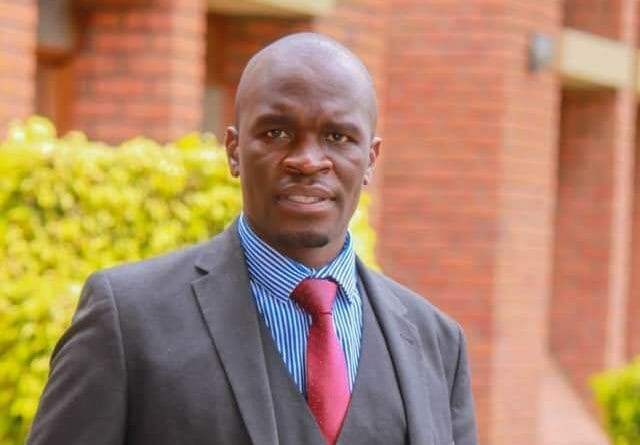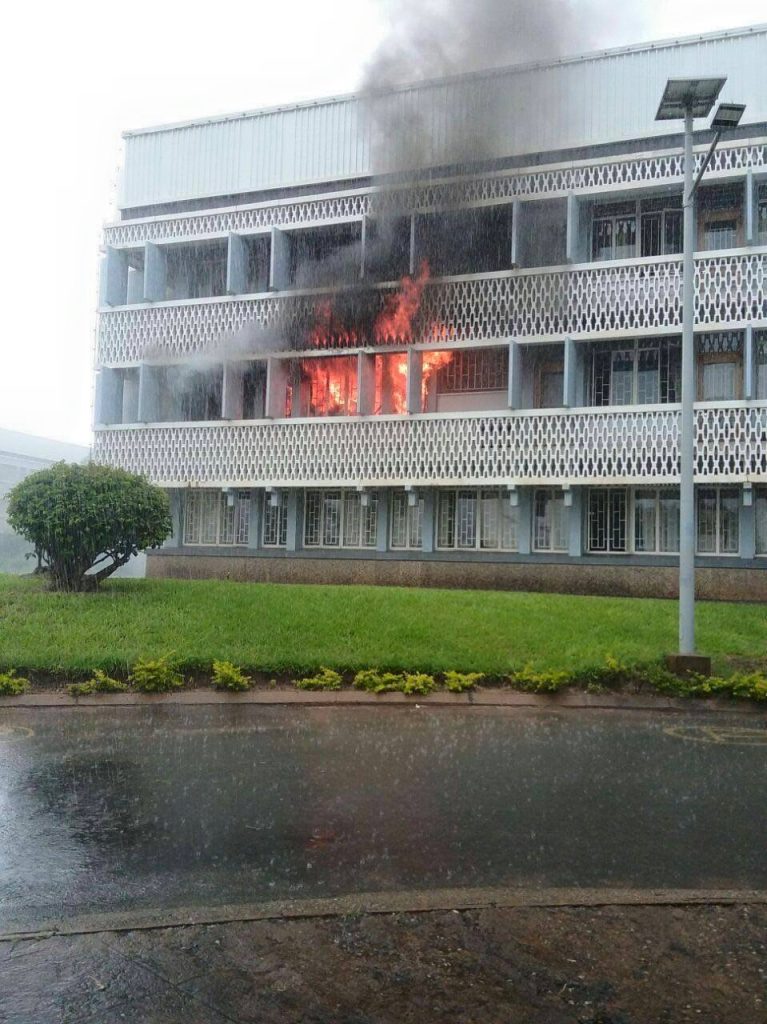BY JACK MCBRAMS
In another twist to the tale, Attorney General Thabo Chakaka Nyirenda says the death of 23-year-old Kotanna Chidyaonga in January 2020 resulted from inducing temik, which was laced with cocaine.
The government’s chief legal advisor has filed court documents arguing that the Lilongwe resident died of poisoning from cocaine-laced temik.
In his 133-page defence submissions to a K300 million lawsuit filed before the Lilongwe Civil Registry Division of the High Court by Kotanna’s boyfriend Timothy ‘Timmy’ Ntilosanje, Nyirenda says he will prove before the courts that Kotanna died of temik poisoning.
“The defendant…herein above states that the defendant will at trial show that the death of the deceased was due to temik laced in cocaine and that the claimant was party to such unlawful conduct,” Nyirenda contends in the defence papers.
The AG adds that at trial, he will show that Timmy and his colleagues misled Police officers by stating that Kotanna’s death was caused by a snake bite when experts’ investigations proved otherwise.
In February, Lilongwe entrepreneur and socialite Timmy filed a K300 million civil suit against the Malawi Police Service, through the Attorney General, for false imprisonment, malicious imprisonment, defamation, exemplary/punitive damages, aggravated damages and cost of the action.
In January 2020, police rounded up Timmy and three friends, Diana Bhagwanji, Gilbert Kamaliza and his girlfriend Ekaree Daniela Chiweza, on accusations that they had a role in the death of his girlfriend Kotanna Chidyaonga.
The four spent 34 days at Maula Prison before the High Court eventually acquitted them in August 2020.
In his summons to the Attorney General, Timmy’s lawyer Khwima Mchizi says the Malawi Police Service maliciously prosecuted his client.
“Initially, the Malawi Police Service, after carrying out their investigations, had concluded that there was no reasonable cause to effect the arrest of the claimant. Police Service to effect the said arrest,” Mchizi claims in the court documents.
The lawyer further claims that Timmy’s arrest and prosecution lacked sufficient reasonable and probable cause since there was no evidence linking him to the death, and the Police acted maliciously in that there were no investigations done to effect the arrest and prosecution.
“Our client is a digital marketer, brand strategist and businessman and his image and standing in society has been tarnished because, as a marketer, image is everything, and our client lost that image when he was viciously prosecuted and spent months in prison for an offence he didn’t do, and he has since been termed a murderer despite being acquitted by the High Court, and it’s because of how the matter was handled by the Police and prosecution which makes everyone think our client is a murderer,” reads a reminder letter to the AG.
Nyirenda: Timmy was with the deceased before the deceased ingesting the poison
However, Nyirenda is challenging the claim.
“The defendant [AG] pleads that the claimant [Timmy] was with the deceased before the deceased ingested the poison and before the deceased’s death. Therefore, according to the doctrine of last seen alive, which shifts the burden on an accused person to explain and account for the last movements of the deceased, where is it determined that the deceased was last seen alive in their company, the Police had reasonable grounds for arresting the claimant,” the AG’s writes in his defence submissions.
He adds that Timmy and his colleagues were the last persons seen with the Kotanna, so there was probable and reasonable cause for prosecuting them.
Nyirenda told PIJ that the civil case would be a thriller.
“It will be a trial of the century. It will reveal a lot of hidden truth,” he said.
Timmy refused to comment on the AG’s new claims, but Mchizi told PIJ that Nyirenda was doing his job.
“He is doing what he was appointed to do. We will see how the court interprets the law and the facts as brought before it,” he said.
In a related development, Mchizi told PIJ they are contemplating filing another civil suit against pathologist Dr Charles Dzamalala, whose flawed post-mortem prompted the Police to arrest Timmy and friends.
“We are contemplating the next course of legal action, but we will file a case against Dr Dzamalala and MalMed, under whose name the report was issued. We are currently monitoring Dr Dzamalala’s appeal against his guilty verdict by the Medical Council of Malawi,” he said.
Mchizi says the AG is merely doing his job.
The story, which was exclusively broken by the Platform for Investigative Journalism in February last year, led the Medical Council of Malawi’s disciplinary committee to take action against Dr Dzamalala.
In his six-page autopsy report, Dr Dzamalala said he found evidence of the toxic substance, temik, in Kottana’s body and concluded that she died of unnatural causes.
“The death…was due to generalised haemolysis following acute poisoning with a pesticide called temik… Based on the circumstances of this death, as per narration above, this acute poisoning is most probably due to a homicidal act rather than suicidal or accidental,” he wrote in his January 13, 2020, report.
However, the Medical Council of Malawi established that the 23-year-old, whose death grabbed as many headlines as it spurned unanswered questions, died as a result of medical negligence after PolyCare Clinic in Lilongwe wrongly administered a lethal dose of vecuronium bromide, instead of anti-venom.
The council eventually found Malawi’s leading pathologist guilty of his questionable post-mortem report following the death of the Lilongwe resident.
Although her friends claimed that Kotanna, aged 23, had stepped on and had been bitten by a snake, in his report, Dr Dzamalala concluded that she had been poisoned.
Dr Dzamalala, who the family had engaged to conduct a forensic post-mortem to establish the exact cause and mode of death, said he found evidence of the toxic substance, temik, in Kottana’s body and concluded that she died of unnatural causes.
Based solely on Dr Dzamalala’s medical opinion, on January 15, 2020, 12 days after Kotanna’s death, the police arrested Timmy, Bhagwanji, Kamaliza and Chaweza for murder.
This is premised on the fact that Kotanna had been poisoned between 9 pm and 11 pm when she encountered the four individuals.
“The particulars of the alleged offences are that Timothy Ntilosanje and three others during the night of 3rd January 2020 at Area 3 in the district of Lilongwe, with malice afterthought, caused the death of Kotanna Chidyaonga,” reads the State’s submission to the court.
However, the High Court and the Supreme Court acquitted the four of murder.
In May last year, the Medical Council of Malawi warned Dr Dzamalala after finding that his pathology report was inconsistent with standard practice.
“The council discussed the case and determined that the late Kotanna Chidyaonga’s forensic pathology report is inconsistent with standard practice for performing and issuing forensic pathology reports because the laboratory he used to determine the causation of death as temik did not have reagents to elicit the levels of venom and the levels of an anaesthetic drug, vecuronium that maybe the most likely to contribute to the cause of death,” reads the Board’s determination.
The Medical Council said there were professional issues that were found that Dr Dzamalala had to attend to.
“He has to conduct his job as a forensic pathologist with due diligence and following due process. The warning means the council doesn’t want to hear the same issues about him again,” he said.
The Medical Council also found Dr Ruth Chimutu, who administered the lethal vecuronium drug that led to Kotanna’s death, guilty of medical negligence.
Dr Chimutu and PolyCare Clinic were accused of mistakenly administering the lethal drug vecuronium bromide instead of anti-venom.
The Medical Council slapped the attendant Dr Ruth with a three-month suspension. She underwent remedial orientation in the Accident and Emergency Department at Queen Elizabeth Central Hospital in Blantyre during that time.
The Council’s assistant registrar, Richard Ndovie, told PIJ that a team of medical experts assembled by the Medical Council had established that it was the vecuronium bromide that led to Kotanna’s death and not, as was previously reported, poisoning or the snake bite.
“The experts concluded that this [death] was a result of an error at the hospital,” he said.
Earlier this year, the Poisons and Medicines Regulatory Authority (PMRA) also slapped PolyCare Clinic pharmacist Rafick Mustaphar on duty on that fateful night with a six-month suspension for negligence.
In court, Mustaphar testified that he had been asked to secure anti-venom from the pharmacy but did not find it when he checked the fridge where they normally stored such drugs. He inquired from Hamil, who directed him to get the drug vecuronium bromide in the medicine cabinet. Mustaphar went and looked, found the drug, and gave it to the nurse, who proceeded to administer it.
“He was found negligent in discharging his duties, which led to dispensing incorrect medication. His conduct in failing to conduct good dispensing procedures is against the code of ethics that guides the pharmacy profession,” PMRA’s verdict reads.
Despite the determinations by both the Medical Council of Malawi and Poisons and Medicines Regulatory Authority faulting their members for medical malpractice, Nyirenda says that he will prove before the court that Timmy and his friends consciously sought medical aid for Kotanna in the form of anti-venom based on a fictitious snake bite as an antidote for the cocaine/temik mixture overdose.
Nyirenda contends that Timmy “made a conscious decision to hide the true reason the medical was being sought for, leading to wrong medical prescription at PolyCare Private Clinic”.








